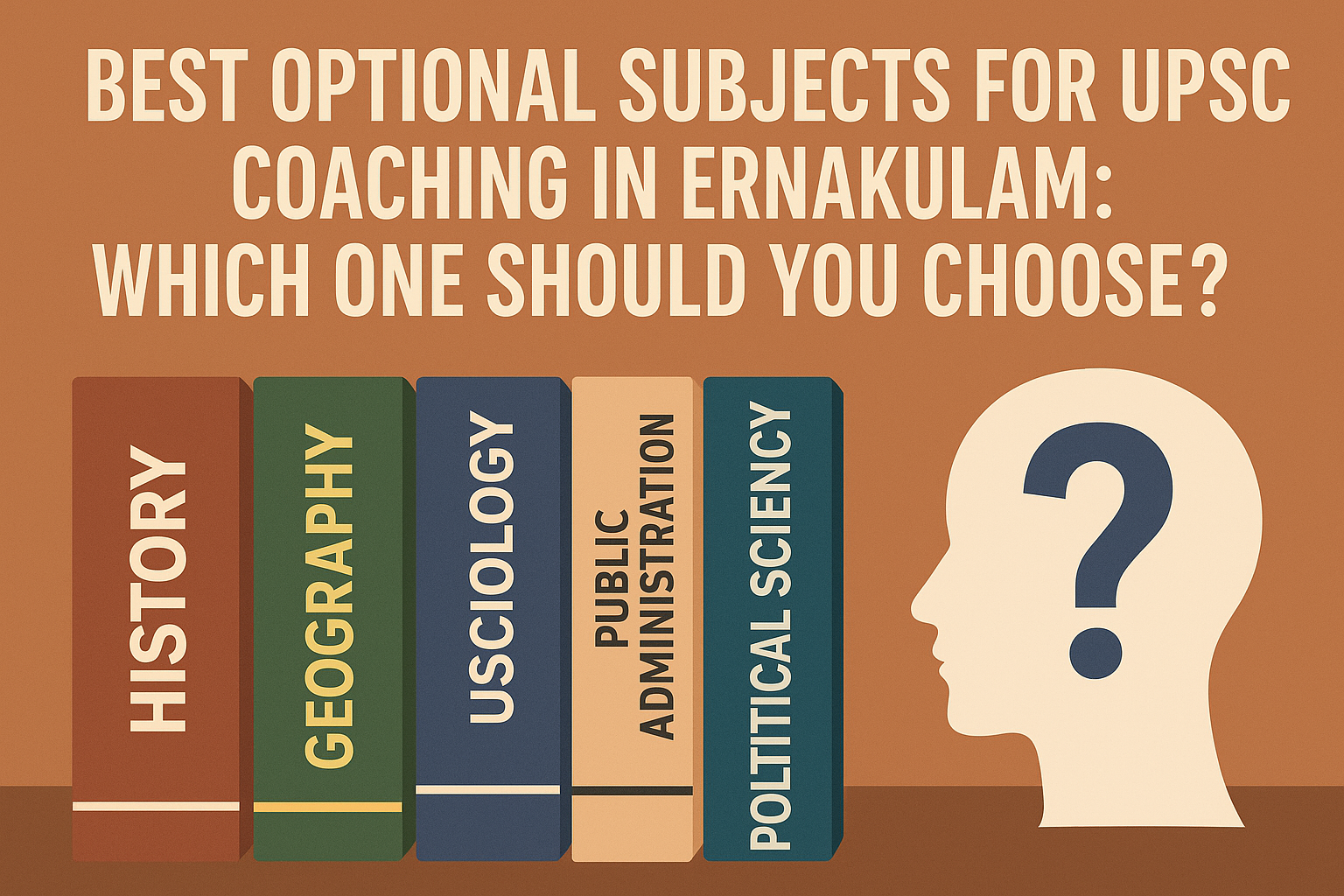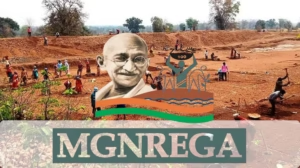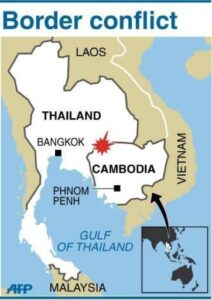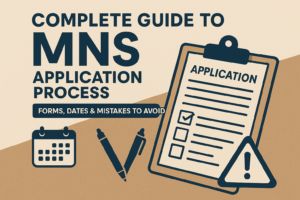Choosing the right optional subject for the UPSC Civil Services Examination is one of the most crucial decisions in your preparation journey. For aspirants in Ernakulam, the choice becomes even more important as it determines not only your Mains score but also the depth of your overall preparation. With the right optional and proper guidance, you can turn this paper into a scoring advantage.
How to Choose the Right Optional Subject
Interest and Background:
Choose a subject you genuinely enjoy studying. If you have a background in that subject or find it conceptually engaging, your preparation becomes easier and more effective.Overlap with General Studies (GS):
Subjects like Public Administration, Geography, Sociology, and Political Science overlap significantly with GS papers and Essay, reducing your workload.Availability of Guidance and Study Material:
In Ernakulam, ensure your chosen subject has reputed coaching support, comprehensive notes, and test series options.Syllabus Size and Scoring Trend:
A concise, well-defined syllabus with consistent scoring trends is ideal. Subjects like Anthropology and Philosophy often offer compact syllabi.Previous Year Questions Analysis:
Study at least the last 10 years of UPSC Mains papers to understand the question pattern and consistency of topics.
Top Optional Subjects in Ernakulam for UPSC Aspirants
1. Public Administration
Why Choose It:
Overlaps strongly with GS Paper II, Ethics, and Essay.
Helps in understanding governance, policy implementation, and administrative reforms.
High availability of coaching and study materials in Ernakulam.
Ideal For: Aspirants from any background interested in governance and policy studies.
2. Geography
Why Choose It:
Strong overlap with GS Paper I (Geography, Environment) and GS Paper III (Disaster Management).
Diagram-based answers help improve scores.
Kerala’s geographical diversity (coasts, Western Ghats, monsoon) adds real-life examples.
Ideal For: Aspirants with science or engineering backgrounds or those who like map-based study.
3. Sociology
Why Choose It:
Conceptual subject with strong overlap in GS (Society, Social Justice, Welfare).
Requires logical presentation rather than rote learning.
Easy to integrate current affairs and Kerala social development models.
Ideal For: Humanities graduates and aspirants interested in social issues and welfare topics.
4. Political Science & International Relations (PSIR)
Why Choose It:
Overlaps with GS Paper II (Polity) and International Relations.
Enhances essay and interview performance.
Covers India’s foreign policy and global diplomacy topics.
Ideal For: Aspirants who follow current affairs and enjoy political theory or international issues.
5. Anthropology
Why Choose It:
Concise syllabus and high-scoring trend in recent years.
Strong focus on Indian tribes and social development issues.
Useful overlap with GS Paper I (Society) and GS Paper II (Welfare Schemes).
Ideal For: Aspirants preferring a scientific yet conceptual subject with compact coverage.
6. History
Why Choose It:
Strong base for GS Paper I (Ancient, Medieval, Modern History).
Kerala has rich historical and cultural context that aids in answer writing.
Good for candidates who love chronology and thematic analysis.
Ideal For: Aspirants passionate about reading and connecting past events with present governance.
7. Economics
Why Choose It:
Overlaps with GS Paper III (Economy) and Essay.
Helps in understanding national and international economic issues.
Kerala’s economic model and NITI Aayog reports add depth to examples.
Ideal For: Aspirants with Commerce, Economics, or Engineering backgrounds.
8. Philosophy
Why Choose It:
Compact syllabus, conceptual clarity, and high potential in Ethics and Essay.
Ideal for analytical thinkers with strong writing skills.
Consistently performing subject with high marks for clear and structured answers.
Ideal For: Aspirants who prefer conceptual and concise preparation.
9. Malayalam Literature
Why Choose It:
Excellent for candidates proficient in Malayalam language and literature.
Compact syllabus with clear boundaries.
Adds uniqueness to Mains answer scripts with Kerala’s literary depth.
Ideal For: Literature graduates and candidates with strong writing skills in Malayalam.
Optional Subject Comparison Table
| Optional Subject | GS/Essay Overlap | Syllabus Size | Scoring Trend | Availability in Ernakulam |
|---|---|---|---|---|
| Public Administration | Very High | Moderate | Consistent | Excellent |
| Geography | High | Broad | Good | Excellent |
| Sociology | High | Moderate | High | Good |
| PSIR | High | Broad | Good | Good |
| Anthropology | Medium | Compact | Very High | Moderate |
| History | Medium | Broad | Moderate | Good |
| Economics | High | Moderate | Good | Good |
| Philosophy | Medium | Compact | High | Moderate |
| Malayalam Literature | Low | Compact | High | Excellent |
Strategy for Optional Preparation
First 30 Days: Understand the syllabus, analyze previous questions, and collect core materials.
Next 60 Days: Complete Paper I and Paper II once, focusing on concepts and definitions.
Next 30 Days: Start answer writing practice and integrate diagrams, maps, or thinkers.
Last 30 Days: Revise key topics, update with current affairs, and attempt 4–6 full-length tests.
Common Mistakes to Avoid
Selecting an optional just because toppers chose it.
Constantly changing subjects mid-preparation.
Ignoring previous year papers and test practice.
Relying only on class notes without developing your own concise summary notes.
Ernakulam Advantage for Optional Preparation
Availability of expert faculty in Public Administration and Geography.
Affordable coaching programs with personalized mentorship.
Exposure to current governance models and Kerala-specific examples.
Access to library facilities, peer groups, and regular test series in the city.
Final Tips for Aspirants
Choose an optional that complements your strengths and academic background.
Start preparation early—ideally before Prelims.
Integrate your optional with GS and Essay for a unified approach.
Consistent writing practice and test feedback are key to scoring 280+ marks.
Conclusion
There is no universally “best” optional subject for UPSC. The best one is the subject you can consistently study, revise, and write answers confidently in.
In Ernakulam, with expert mentorship, structured coaching, and focused preparation, aspirants can excel in any optional—be it Public Administration, Geography, or Sociology. The key is consistency, conceptual clarity, and effective answer presentation.






